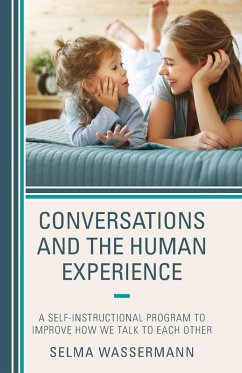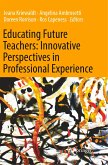Selma Wassermann
Conversations and the Human Experience
A Self-Instructional Program to Improve How We Talk to Each Other
Selma Wassermann
Conversations and the Human Experience
A Self-Instructional Program to Improve How We Talk to Each Other
- Broschiertes Buch
- Merkliste
- Auf die Merkliste
- Bewerten Bewerten
- Teilen
- Produkt teilen
- Produkterinnerung
- Produkterinnerung
Learning to respond with respect and understanding to others is the primary objective of this book.
Andere Kunden interessierten sich auch für
![Conversations and the Human Experience Conversations and the Human Experience]() Selma WassermannConversations and the Human Experience71,99 €
Selma WassermannConversations and the Human Experience71,99 €![Educating Future Teachers: Innovative Perspectives in Professional Experience Educating Future Teachers: Innovative Perspectives in Professional Experience]() Educating Future Teachers: Innovative Perspectives in Professional Experience82,99 €
Educating Future Teachers: Innovative Perspectives in Professional Experience82,99 €![Culture, Clichés, and Conversations Culture, Clichés, and Conversations]() Anthony P. BarberCulture, Clichés, and Conversations48,99 €
Anthony P. BarberCulture, Clichés, and Conversations48,99 €![Culture, Clichés, and Conversations Culture, Clichés, and Conversations]() Anthony P. BarberCulture, Clichés, and Conversations92,99 €
Anthony P. BarberCulture, Clichés, and Conversations92,99 €![Mathematical Conversations within the Practice of Mathematics Mathematical Conversations within the Practice of Mathematics]() Lynn M. Gordon CalvertMathematical Conversations within the Practice of Mathematics36,55 €
Lynn M. Gordon CalvertMathematical Conversations within the Practice of Mathematics36,55 €![Attention Deficit Hyperactivity Disorder in New Zealand Attention Deficit Hyperactivity Disorder in New Zealand]() Lee HooperAttention Deficit Hyperactivity Disorder in New Zealand15,95 €
Lee HooperAttention Deficit Hyperactivity Disorder in New Zealand15,95 €![Slow Looking Slow Looking]() Shari TishmanSlow Looking216,99 €
Shari TishmanSlow Looking216,99 €-
-
-
Learning to respond with respect and understanding to others is the primary objective of this book.
Hinweis: Dieser Artikel kann nur an eine deutsche Lieferadresse ausgeliefert werden.
Hinweis: Dieser Artikel kann nur an eine deutsche Lieferadresse ausgeliefert werden.
Produktdetails
- Produktdetails
- Verlag: Rowman & Littlefield Publishers
- Seitenzahl: 112
- Erscheinungstermin: 27. August 2022
- Englisch
- Abmessung: 216mm x 140mm x 6mm
- Gewicht: 152g
- ISBN-13: 9781475867541
- ISBN-10: 1475867549
- Artikelnr.: 64142212
- Herstellerkennzeichnung
- Libri GmbH
- Europaallee 1
- 36244 Bad Hersfeld
- gpsr@libri.de
- Verlag: Rowman & Littlefield Publishers
- Seitenzahl: 112
- Erscheinungstermin: 27. August 2022
- Englisch
- Abmessung: 216mm x 140mm x 6mm
- Gewicht: 152g
- ISBN-13: 9781475867541
- ISBN-10: 1475867549
- Artikelnr.: 64142212
- Herstellerkennzeichnung
- Libri GmbH
- Europaallee 1
- 36244 Bad Hersfeld
- gpsr@libri.de
By Selma Wassermann
Preface
Acknowledgements
Introduction
What's the good of it? (It's not about the cheese)
How the book is organized
Part One: The Essential Components of Effective Human Interactions
Chapter 1: Listening: "tuning in"
Key conditions in active listening
Developing active listening skills
Chapter 2: Responding
The overarching condition of respect
Selecting appropriate responses
Paraphrasing
End notes
One final word
Chapter 3: The art of the question
Questions that should be avoided
More productive questions
Turning questions into statements of inquiry
The well-orchestrated discussion
Conclusion
Chapter 4: Once more with feeling
Conclusion
Chapter 5: Caveats: When the divide is too great
Part Two
Chapter 6: Introduction to the skill development materials
Chapter 7: Introduction to facilitative interactions: Task 1
Studying the conversations
Thinking about conversations #1
Thinking about conversation #2
Thinking about conversation #3
Thinking about conversation #4
Reflecting on interpersonal facilitative responding
Conclusion
Figure 1: Analyzing Responses in Human Discourse
Chapter 8: Practice in choosing appropriate responses
Practice task
Self-evaluation of your responses
Conclusion
Chapter 9: Practice in attending and responding with respect (encore)
Task
Self-evaluation of your responses
Conclusion
Chapter 10: Creating your own scenario
Self-evaluation of your conversation
Conclusion
Chapter 11: One-on one practice in attending and responding with respect
(A)
Pre-conditions
Task
Conclusion
Chapter 12: One-on-one practice in attending and responding with respect
(B)
Points to remember in interpersonal discussions
Pre-conditions
Task
Conclusion
Chapter 13: Practice in attending and responding (Encore)
Conclusion
Chapter 14: Using effective interpersonal skills in real situations
Chapter 15: Last Words
Just one more thing
Bibliography
Acknowledgements
Introduction
What's the good of it? (It's not about the cheese)
How the book is organized
Part One: The Essential Components of Effective Human Interactions
Chapter 1: Listening: "tuning in"
Key conditions in active listening
Developing active listening skills
Chapter 2: Responding
The overarching condition of respect
Selecting appropriate responses
Paraphrasing
End notes
One final word
Chapter 3: The art of the question
Questions that should be avoided
More productive questions
Turning questions into statements of inquiry
The well-orchestrated discussion
Conclusion
Chapter 4: Once more with feeling
Conclusion
Chapter 5: Caveats: When the divide is too great
Part Two
Chapter 6: Introduction to the skill development materials
Chapter 7: Introduction to facilitative interactions: Task 1
Studying the conversations
Thinking about conversations #1
Thinking about conversation #2
Thinking about conversation #3
Thinking about conversation #4
Reflecting on interpersonal facilitative responding
Conclusion
Figure 1: Analyzing Responses in Human Discourse
Chapter 8: Practice in choosing appropriate responses
Practice task
Self-evaluation of your responses
Conclusion
Chapter 9: Practice in attending and responding with respect (encore)
Task
Self-evaluation of your responses
Conclusion
Chapter 10: Creating your own scenario
Self-evaluation of your conversation
Conclusion
Chapter 11: One-on one practice in attending and responding with respect
(A)
Pre-conditions
Task
Conclusion
Chapter 12: One-on-one practice in attending and responding with respect
(B)
Points to remember in interpersonal discussions
Pre-conditions
Task
Conclusion
Chapter 13: Practice in attending and responding (Encore)
Conclusion
Chapter 14: Using effective interpersonal skills in real situations
Chapter 15: Last Words
Just one more thing
Bibliography
Preface
Acknowledgements
Introduction
What's the good of it? (It's not about the cheese)
How the book is organized
Part One: The Essential Components of Effective Human Interactions
Chapter 1: Listening: "tuning in"
Key conditions in active listening
Developing active listening skills
Chapter 2: Responding
The overarching condition of respect
Selecting appropriate responses
Paraphrasing
End notes
One final word
Chapter 3: The art of the question
Questions that should be avoided
More productive questions
Turning questions into statements of inquiry
The well-orchestrated discussion
Conclusion
Chapter 4: Once more with feeling
Conclusion
Chapter 5: Caveats: When the divide is too great
Part Two
Chapter 6: Introduction to the skill development materials
Chapter 7: Introduction to facilitative interactions: Task 1
Studying the conversations
Thinking about conversations #1
Thinking about conversation #2
Thinking about conversation #3
Thinking about conversation #4
Reflecting on interpersonal facilitative responding
Conclusion
Figure 1: Analyzing Responses in Human Discourse
Chapter 8: Practice in choosing appropriate responses
Practice task
Self-evaluation of your responses
Conclusion
Chapter 9: Practice in attending and responding with respect (encore)
Task
Self-evaluation of your responses
Conclusion
Chapter 10: Creating your own scenario
Self-evaluation of your conversation
Conclusion
Chapter 11: One-on one practice in attending and responding with respect
(A)
Pre-conditions
Task
Conclusion
Chapter 12: One-on-one practice in attending and responding with respect
(B)
Points to remember in interpersonal discussions
Pre-conditions
Task
Conclusion
Chapter 13: Practice in attending and responding (Encore)
Conclusion
Chapter 14: Using effective interpersonal skills in real situations
Chapter 15: Last Words
Just one more thing
Bibliography
Acknowledgements
Introduction
What's the good of it? (It's not about the cheese)
How the book is organized
Part One: The Essential Components of Effective Human Interactions
Chapter 1: Listening: "tuning in"
Key conditions in active listening
Developing active listening skills
Chapter 2: Responding
The overarching condition of respect
Selecting appropriate responses
Paraphrasing
End notes
One final word
Chapter 3: The art of the question
Questions that should be avoided
More productive questions
Turning questions into statements of inquiry
The well-orchestrated discussion
Conclusion
Chapter 4: Once more with feeling
Conclusion
Chapter 5: Caveats: When the divide is too great
Part Two
Chapter 6: Introduction to the skill development materials
Chapter 7: Introduction to facilitative interactions: Task 1
Studying the conversations
Thinking about conversations #1
Thinking about conversation #2
Thinking about conversation #3
Thinking about conversation #4
Reflecting on interpersonal facilitative responding
Conclusion
Figure 1: Analyzing Responses in Human Discourse
Chapter 8: Practice in choosing appropriate responses
Practice task
Self-evaluation of your responses
Conclusion
Chapter 9: Practice in attending and responding with respect (encore)
Task
Self-evaluation of your responses
Conclusion
Chapter 10: Creating your own scenario
Self-evaluation of your conversation
Conclusion
Chapter 11: One-on one practice in attending and responding with respect
(A)
Pre-conditions
Task
Conclusion
Chapter 12: One-on-one practice in attending and responding with respect
(B)
Points to remember in interpersonal discussions
Pre-conditions
Task
Conclusion
Chapter 13: Practice in attending and responding (Encore)
Conclusion
Chapter 14: Using effective interpersonal skills in real situations
Chapter 15: Last Words
Just one more thing
Bibliography








